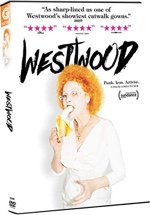She’s been a fixture of the counterculture since, well, she helped invent the punk aesthetic in London in the 1970s with her then-partner Malcolm McLaren, who dressed the band he managed — the Sex Pistols — in clothes she made, such as a T-shirt with straitjacket-esque too-long sleeves. Today, in her 70s, she remains an iconoclast in her artistic sense, her designs alive with funky prints and retro-futuristic shapes, as well as in her business sense: her company is almost unique among the big designers in that it is completely independent, not a subsidiary of a global corporation.
So it’s difficult to believe that there hasn’t been a significant documentary about Vivienne Westwood until now. Or, you know, probably it’s not surprising: Westwood: Punk, Icon, Activist includes an enraging clip from a major 1980s BBC chat show in which she and her fashions are held up as objects of ridicule. (She keeps her cool, but I fumed on her behalf.) Has that ever happened to a male fashion designer? I doubt it. Instead, they get fawning documentaries made about them.

There’s nothing fawning about this film, which is absolutely appropriate for the irascible, no-fucks-given Westwood. In fact, director Lorna Tucker, making her feature debut, struggles with her subject: Westwood simply has no interest in participating in an exploration and analysis of her life or her work. “Oh, who wants to hear about the Sex Pistols?” she moans. (We do!) Westwood is not all that impressed with herself, saying that she’s come to the conclusion that “we weren’t attacking the establishment [as punks], we were just part of the distraction,” which is difficult to argue with. I’m not sure if Tucker intended it ironically when she cuts to a curator at London’s Victoria & Albert museum explaining the vital importance of Westwood’s work. But when you get the stamp of approval from what is possibly the planet’s leading design institution, well, one wonders whether a counterculture even exists anymore. If it ever truly did.
The lack of meaningful input from Westwood herself makes the film feel a bit scattershot, and like we’re probably missing quite a bit of really juicy stuff; Tucker assembles her story from archival footage and tales from third parties, including her current husband, Andreas Kronthaler, her design partner. (He’s a former student of hers and much younger. See, that’s a real thing.) She’s such an incredible personality that it doesn’t matter. Her life is almost a perfect reflection of the trajectory of 20th-century feminism. Her attempts to play at being a housewife, because that was what was expected of her. (It didn’t last.) Her explosion of creativity and her demands to be accepted on her own terms in the punk era. (“I got intellectually bored with Malcolm” is how she explains their breakup, which is a thing women need to admit publicly more often). Her perseverance as a designer in the 80s and 90s until the industry simply couldn’t ignore her anymore. Her position today, as a radical, aggressive, wise elder who agitates for social justice along many vectors. (Some of her issues, such as the environment and anti-consumerism, are deemed by critics to be contrary to the very nature of her company and its products.) Her refusal to give up or settle for anything: “I’m still not happy with my company” even now, she concedes. She’s a remarkable role model for girls and women, and stories like hers aren’t heard anywhere near enough.
Westwood: Punk, Icon, Activist is the Alliance of Women Film Journalists’ Movie of the Week for June 15th. Read the comments from AWFJ members — including me — on why the film deserves this honor.
























She is my favorite “fancy” designer. If I had tons of money, I would wear her work nearly exclusively. (At least, all the femme things.) And, yes, she has no fucks to give.
I really like some of the designs we see in this movie. And if I had a ton of money and places to wear them to, I might buy them.